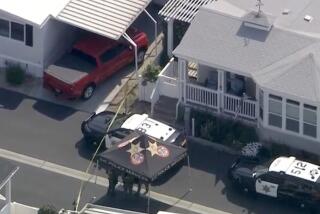Deputy shot dead outside his home
- Share via
A 27-year-old Los Angeles County sheriff’s deputy, praised by his bosses as a “local success story” after growing up in a neighborhood entrenched in gang warfare, was gunned down Saturday outside his boyhood home in Cypress Park as he left for work.
Law enforcement officials said the motive for the attack remained “wide open” and investigators were trying to track down a white, four-door vehicle that approached Deputy Juan Abel Escalante shortly before gunfire rang out about 5:40 a.m.
A neighbor said she heard at least three gunshots, followed by screeching tires. A minute later, the silence was broken by screams of “My husband! My husband!” said the neighbor, who declined to give her name for fear of gang retaliation.
Escalante’s wife and mother rushed to the deputy, who was not wearing his uniform, the neighbor said.
Los Angeles Police Chief William J. Bratton said it was “too early to know” whether the shooting was gang related or connected to the deputy’s assignment at Men’s Central Jail in downtown Los Angeles. Deputies typically work in the county jails as their first assignment.
Escalante, his wife and their three children were living with his parents but were preparing to buy a home in Pomona.
The blue-collar neighborhood of modest single-family homes northeast of downtown had experienced a fragile lull in gang violence in recent years until feuding between rival groups erupted in January.
In February, a shooting outside an elementary school a few blocks from Escalante’s home touched off a fierce gun battle between gang members and police in neighboring Glassell Park. The violence led to a massive gang raid in late June by heavily armed police and federal agents, who stormed an area around Drew Street, about a mile north of where Escalante was slain.
While the number of gang crimes across the city of Los Angeles has fallen this year, the Cypress Park neighborhood and the surrounding northeast section of the city is among the few areas that have seen a significant rise, according to police department crime statistics. The LAPD’s Northeast Division reported 11 homicides from January through June 26, up from six over the same period last year.
Bratton said the slaying was the first in the area since the June gang raid.
Los Angeles County Sheriff Lee Baca described Escalante, a U.S. Army reservist and 2 1/2-year department veteran, as “dedicated and hard-charging in the best sense of the word. . . . He lived up to the dream of serving his country, serving his county and honoring his family.
“Today is a very difficult day,” Baca said.
Law enforcement sources, who spoke on condition of anonymity because they did not have permission to talk about the pending investigation, said detectives were pursuing a broad range of possible reasons for the attack. Among them are whether the slaying was a gang-related assassination connected to Escalante’s work at the jail, a random drive-by shooting or the result of someone’s personal grudge.
“The best detectives in our police department are handling this case,” said Deputy Chief Sergio Diaz of the LAPD.
Police cordoned off two blocks of Aragon Avenue between Maceo Street and Thorpe Avenue as officers blanketed the area most of the day.
For hours, detectives knocked on doors and combed the sidewalk and street near the deputy’s home for clues. Several shell casings lay on the street. A hip-high black curtain surrounded Escalante’s body, which was covered in a white sheet, until coroner’s officials removed the body at 11:45 a.m.
Police officials brushed nearly every inch of the deputy’s black GMC sport utility vehicle for fingerprints until it was towed away at 4:05 p.m.
Steve Remige, president of the Assn. for Los Angeles Deputy Sheriffs, released a statement saying he was confident that Escalante’s killers would be caught.
“Tragic events like these remind us that simply being a law enforcement officer in Los Angeles is an act of bravery,” he said. “Juan will be missed by all of us.”
A local resident, Gloria Ruiz, said that her son and Escalante had grown up together and had both served in the military. She said he had a strict upbringing and his mother “would gleam whenever he had good grades.”
The small working-class neighborhood north of Interstate 5 and west of the 110 Freeway is a community gripped by fear. Several neighbors agreed to talk about Escalante but refused to give their names for fear of gang violence. One resident carrying a baby said the sound of gunfire is so common that she decided not to call police when she heard the shooting.
Another neighbor described the deputy as the eldest son of immigrant parents from the Mexican state of Yucatan. His mother worked at a candy store and his father was a construction laborer, the neighbor said.
The neighbor said Escalante was serious and industrious and worked hard after he returned from military service, studying to join the Sheriff’s Department. He rarely talked about his work after he became a deputy.
“If someone here knew he was a sheriff, it’s kind of like a trophy to kill one of them,” the neighbor said.
Escalante’s death marked the first killing of an L.A. County sheriff’s deputy since Maria Cecilia Rosa was gunned down in March 2006.
Rosa was killed in Long Beach in a botched robbery attempt as she left another deputy’s house for work at the Inmate Reception Center in downtown Los Angeles. In May, the gunman convicted in the shooting was sentenced to death. An accomplice was sentenced to life in prison.
--
andrew.blankstein@ latimes.com
Times staff writers Mary Engel and Jack Leonard contributed to this report.
More to Read
Sign up for Essential California
The most important California stories and recommendations in your inbox every morning.
You may occasionally receive promotional content from the Los Angeles Times.










